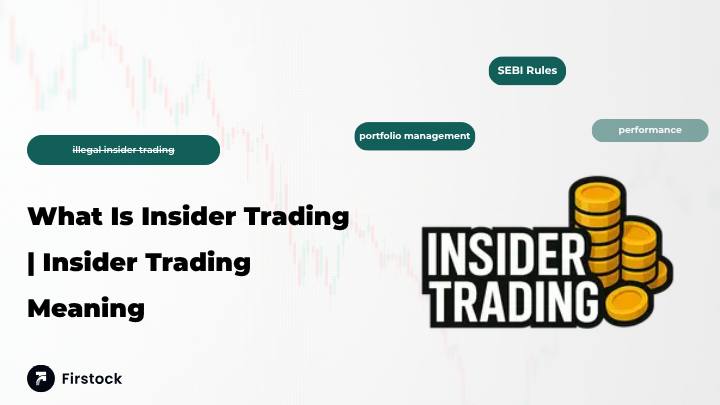What Is Insider Trading | Insider Trading Meaning & SEBI Rules

What Is Insider Trading? Understanding the Hidden Side of the Stock Market
Have you ever thought about how some people just seem to know the exact moment when a stock is going to increase or decrease as if they had a crystal ball?
Actually, it is not always magic sometimes, it is simply insider trading.
The phrase sounds fascinating, almost like a part of a financial thriller movie.
But in the everyday world, insider trading may result in a harsh punishment of the law.
This blog will explain the concept of insider trading, the mechanism of insider trading, the reasons why it is regarded as illegal most of the time, and the information about SEBI insider trading regulations in India.
What Is Insider Trading?
Let’s start simple.
Using private, non-public knowledge to purchase or sell business stock is known as insider trading.
To put it another way, it occurs when someone with access to "inside information" trades on it before it is made public, such as corporate results before they are revealed, a merger deal, or regulatory permission.
Example:Suppose you work at a pharmaceutical company that’s about to announce a breakthrough drug approval. You know the stock price will jump once the news is out.If you buy shares before the public announcement — that’s insider trading.
The key here is access to unpublished price-sensitive information (UPSI) — information that could affect the stock price once made public.
Legal vs Illegal Insider Trading
Now, here’s something that surprises many beginners —Not all insider trading is illegal.
There’s a fine line between legal and illegal insider trading.
So, the difference lies in intent and timing — whether the trade was based on public or private information.
Why Is Insider Trading a Problem?
At first glance, insider trading may not seem harmful — after all, it’s just someone making an informed trade, right?
But here’s the issue:
- It’s Unfair: Ordinary investors don’t have the same inside information, which destroys market fairness.
- It Erodes Trust: If people think the market is “rigged” by insiders, they lose confidence — and fewer investors participate.
- It Hurts Companies: Insider trading can distort stock prices and lead to unnecessary volatility, damaging a company’s reputation.
- It’s Illegal (in most cases): Regulators like SEBI treat insider trading as a serious offense, punishable by fines and imprisonment.
Disclaimer: Trading based on non-public information is a criminal offense in India under SEBI’s regulations. Always ensure you act only on publicly available information.
Insider Trading Regulations SEBI — The Legal Framework in India
The Securities and Exchange Board of India (SEBI) governs insider trading under the SEBI (Prohibition of Insider Trading) Regulations, 2015.
The Objective:
To prevent misuse of confidential information and ensure transparency and equality among investors.
Key Provisions:
- Unpublished Price-Sensitive Information (UPSI): Information that, if made public, could affect the stock price — e.g., earnings, mergers, acquisitions, or dividends.
- Who Is an Insider?
- Company directors, officers, employees
- Auditors, consultants, lawyers
- Anyone who has access to UPSI directly or indirectly
- Trading Window Restrictions: Companies close their trading window before major announcements — insiders can’t trade during this period.
- Disclosure Requirements: Every insider trade must be disclosed to SEBI and the stock exchanges within two trading days.
- Penalty for Insider Trading:
- Monetary fines up to ₹25 crore
- Imprisonment up to 10 years (under the SEBI Act, 1992)
SEBI constantly monitors trading activity, using pattern recognition and algorithmic surveillance, to detect suspicious trades — even those done indirectly through relatives or associates.
Insider Trading Examples in India
Let's examine some real-world examples to see how it functions in practice. 1. Reliance Industries' (2007) RIL Case
Reliance Industries was fined ₹25 crore by SEBI in 2021 for allegedly engaging in insider dealing and manipulating Reliance Petroleum shares in 2007.
Everyone was reminded by this case that any business, regardless of size, is subject to inspection.
2. Axis Bank Employees Case
Some Axis Bank employees were caught trading based on quarterly earnings data before official results were announced. SEBI investigated and barred them from the markets temporarily — showing how insider trading isn’t limited to top management.
3. Biocon Insider Case
In 2022, SEBI penalized Biocon’s compliance officer and connected persons for violating trading window norms — highlighting how even compliance lapses can be treated as insider trading.
How SEBI Detects Insider Trading
You might wonder — how can SEBI track something so discreet?
Here’s how:
- Trade Pattern Analysis: Identifies unusual trades before major announcements.
- Phone and Email Records: SEBI can request call data and digital communication if required.
- Surveillance Systems: Advanced software detects “coincidental” profits by connected individuals.
- Whistleblower Tips: Workers or colleagues frequently disclose questionable activity.
SEBI uses these instruments to guarantee market accountability and transparency.
Is Insider Trading Permitted in India?
In summary, insider trading based on confidential knowledge is prohibited in India.Legal insider trading, on the other hand, is acceptable and even frequent when business insiders declare and report their trades.
Here’s the distinction in simpler terms:
How Companies Prevent Insider Trading
Most listed companies in India follow a strict Code of Conduct under SEBI’s guidelines.
Here’s what they typically do:
- Maintain a list of “designated persons” who have UPSI access
- Close trading windows before major results or events
- Monitor trades made by employees and relatives
- Conduct regular awareness programs
Frstock not only makes trading easy but also educates the investors by explaining to them how regulations function thus giving them a clear view of trading and the following of SEBI rules.
What are the ways of staying away from being involved in insider trading even by mistake?
Numerous investors in the market are innocent and thus they fall into the traps of insider trading. Below are some smart ways to ensure your protection:
- Don’t Trade on Tips from Employees or Insiders If someone “in the company” shares upcoming results or mergers, stay away.
- Wait for Official Announcements Only act on news published by stock exchanges, SEBI, or company filings.
- Avoid Sharing Sensitive Information Even casually discussing non-public data can get you in trouble.
- Check Trading Window Periods If you work for a listed company, make sure the window is open before trading.
- Keep Records of Your Trades Always document your transactions — they’re your proof of transparency.
Disclaimer: Even indirect access to insider information (through family or colleagues) can be punishable under SEBI laws. Always act only on publicly available data.
Impact of Insider Trading on Stock Markets
The effects of insider trading ripple across the entire market:
That’s why insider trading isn’t just a regulatory offense — it’s a threat to the integrity of financial markets.
The Global Perspective: How Other Countries Handle It
India is not the only country that is battling the issue of insider trading.
United States (SEC) The U.S. Securities and Exchange Commission (SEC) has a set of very stringent laws against insider trading in the world infringement usually leads to heavy penalties as well as jail terms.
United Kingdom (FCA) The Financial Conduct Authority treats insider trading as a felony, and the consequences of this crime include incarceration for up to 7 years.
Singapore Monetary Authority of Singapore (MAS) implements insider trading prevention with modern, real-time surveillance tools.
India (SEBI) SEBI has gone through a fast-paced transition of its surveillance methods, effectively meeting worldwide criteria and thus making the Indian market highly transparent and trustworthy.
Famous Global Insider Trading Cases
Martha Stewart (U.S.) Found guilty of divesting her shares based on a non-public FDA decision.
Raj Rajaratnam (Galleon Group) Hedge fund manager who was handed a prison term of 11 years due to insider trading.
Gupta-Rajaratnam Case Ex-McKinsey CEO, Rajat Gupta got convicted for providing confidential information.
These examples demonstrate that insider trading is a grave offense of the law and should be treated as such irrespective of place and status.
Conclusion: Transparency Is the True Edge
Information is the most powerful tool in the world of markets, but it must be utilized in a just manner.
The presence of insider trading totally disturbs the equilibrium, which is the hallmark of a fair game, and in this case, the transactors suffer, both the perpetrators and the victims, indirectly. For investors and traders, the best strategy is always compliance, discipline, and transparency.
By knowing what is insider trading you not only keep yourself out of trouble but also grow a strong ethical base as a player in the market.
Firstock - option trading app gives the power to investors by providing disclosures, compliance alerts, and educational material in real time thus making every trade open and ready for regulation.
Disclaimer: This article is for educational purposes only. It does not constitute legal or investment advice. Always adhere to SEBIs trading regulations and take the advice of a financial advisor if required.
FAQs
1. What is insider trading in India?
It is a situation where a person uses confidential and sensitive information to make transactions in the corporate securities market. Such a person is in violation of SEBIs insider trading regulations.
2. Is insider trading legal in India?
Not at all. It is illegal if the insider trade is based on non-public information. Company insiders can only perform trades that are disclosed, and those are the only legal ones.
3. What are insider trading regulations that SEBI has introduced?
The SEBI (Prohibition of Insider Trading) Regulations, 2015 is a code of conduct that offers measures aimed at stopping the use of confidential information to enrich oneself and, at the same time, maintain market transparency.
4. Who is considered an insider under SEBI?
One who, either directly or indirectly, is aware of the share prices that have not yet been made public.
5. What is the punishment for insider trading in India?
Among the penalties, there are significant fines of up to 25 crores and a jail term of up to ten years, or a court may order a mix of the two, depending on how serious the crime is.
6. Can insider trading be done accidentally?
Indeed it can for instance, if a trader acts on a tip casually given by someone who is in the know, this can still be considered an illegal activity.
7. How does SEBI detect insider trading?
By using online monitoring tools, analyzing trading records, and getting information from whistleblowers.





